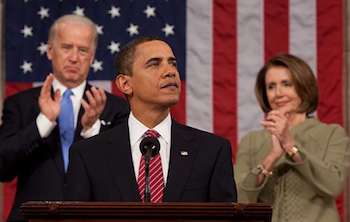- MENU
- HOME
- SEARCH
- WORLD
- MAIN
- AFRICA
- ASIA
- BALKANS
- EUROPE
- LATIN AMERICA
- MIDDLE EAST
- United Kingdom
- United States
- Argentina
- Australia
- Austria
- Benelux
- Brazil
- Canada
- China
- France
- Germany
- Greece
- Hungary
- India
- Indonesia
- Ireland
- Israel
- Italy
- Japan
- Korea
- Mexico
- New Zealand
- Pakistan
- Philippines
- Poland
- Russia
- South Africa
- Spain
- Taiwan
- Turkey
- USA
- BUSINESS
- WEALTH
- STOCKS
- TECH
- HEALTH
- LIFESTYLE
- ENTERTAINMENT
- SPORTS
- RSS
- iHaveNet.com: Politics
by Kenneth T. Walsh

President Obama
In his State of the Union address, Obama laid out his proposals for creating jobs
President Obama promised to make creating jobs and strengthening the economy his top priorities in 2010. In his 71-minute State of the Union address, a mostly somber but confident Obama argued that "again, we are tested, and again, we must answer history's call."
Upon taking office a year ago, the president said, he faced a staggering series of crises, including an economic meltdown, rising unemployment, and two wars. He outlined a daunting list of remaining problems and returned to his 2008 campaign summons to end the hyperpolarization in Washington by reminding
But he said the "great decency and great strength" of everyday Americans make him more hopeful than ever about the future. "We do not give up," the president said. "We do not quit. We don't allow fear or division to break our spirit. In this new decade, it's time the American people get a government that matches their decency, that embodies their strength."
In the official Republican response, Bob McDonnell, the newly inaugurated governor of Virginia, criticized the Obama administration and majority Democrats in
Obama admitted that he has suffered some setbacks in the past year and that some of them were "deserved." He also conceded that many Americans don't think he is delivering on his promise of change, but he said he would keep trying to improve the way Washington works and to reach some complex, difficult objectives left over from 2009, just as everyday Americans keep pursuing their own goals despite adversity.
Obama didn't come up with a new framework for his presidency or a fresh, unifying vision, which many of his supporters had favored as a way to boost his job-approval ratings and restore confidence in his administration. Instead, he announced a series of initiatives, some new and others that had been previously announced, in an effort to put himself on the side of change and bill himself as a tribune of everyday people.
The president spent much of his speech defending his record of the past year, arguing that his economic recovery plan has created or saved numerous jobs and helped the economy grow again after two years of recession. He promised that job creation would be his top goal in 2010 and called for a "new jobs bill" to be passed by
Among his proposals:
-Taking the
-Enacting a package of tax incentives for small businesses.
-Creating jobs by rebuilding the nation's infrastructure, such as roads, bridges, and sewers.
-Providing rebates to people who make their homes more energy efficient.
-Slashing tax breaks to companies that shift jobs overseas and giving tax breaks to companies that create jobs in the United States.
He repeated a proposal from earlier this week to freeze most discretionary domestic spending for three years. And he said he would issue an executive order creating a bipartisan fiscal commission to recommend ways of reducing the deficit. The
Regarding energy, Obama called for a new generation of "safe, clean nuclear power plants" in the United States, some carefully planned offshore oil and gas development, continued investment in biofuels and clean-coal technologies, and legislation to limit climate change.
He pledged to continue working to overhaul the healthcare system but didn't clarify how to break the logjam that has stalled compromise in
He also supported a program to increase U.S. exports and open global markets to U.S. goods, and a plan to increase funding for education. And he called for ending the military's "don't ask, don't tell" policy regarding homosexuality in the armed forces in order to allow gay people to serve openly in the military.
He called on members of
Toward the end of his address, he repeated his plan to end the Iraq war and called for a continued effort to fight terrorism. But clearly, strengthening the domestic economy is Obama's Job 1.
Available at Amazon.com:
The Political Fix: Changing the Game of American Democracy, from the Grassroots to the White House
AMERICAN POLITICS
WORLD | AFRICA | ASIA | EUROPE | LATIN AMERICA | MIDDLE EAST | UNITED STATES | ECONOMICS | EDUCATION | ENVIRONMENT | FOREIGN POLICY | POLITICS
Receive our political analysis by email by subscribing here
Obama's Job No. 1: Create Jobs & Strengthen the Economy | Kenneth T. Walsh
© Tribune Media Services